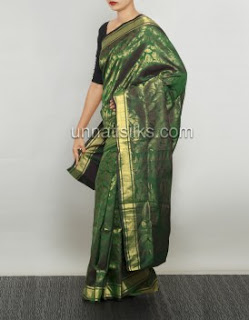The Kanchipuram( or Kanjivaram) Saree, known
for its traditional grandeur and rich feel, is chosen for its exclusivity, and displayed
only on special occasions.
Kanchipuram, near Chennai, is famous for its
Kanchipuram or Kanjeevaram Sarees.
Traditionally Kanjeevaram Sarees are of silk
and cotton. However the Kanchipuram Silk Saree, exclusively known for its regal
look and grand feel is the possessor’s pride and the envy of others. No marriage
or traditional function in South India seems solemnized unless the resplendent Kanchipuram
Silk Saree adorns many a woman present on the occasion.
Kanchipuram Silk Sarees are made of pure silk, achieving
their grandeur from the motifs having zari of silk threads dipped in liquid
gold and silver. Classification as a Kanjeevaram Sari, needs the Geographical Indication (GI) stipulation, that the decorative zari must
have at least 57% silver and 0.6% gold in it, be followed in word and detail.
A geographical indication (GI) is a name or sign used on certain products which corresponds
to a specific geographical location or origin. The use of a GI may act as a
certification that the product possesses certain qualities, is made according
to traditional methods, or enjoys a certain reputation, due to its geographical
origin.
Kanchipuram Sarees have GI label for the
product since 2005.
Elegant broad borders with colours and designs
different from that of the body highlight the Kanjeevaram Silk Saree. The pallu
or hanging end of the saree, could be of the same colour and design as that of
the border or could differ. If different, it is woven separately and then finely
attached to the main saree.
A Kanjeevaram Silk Sari could take two to
three weavers working simultaneously, anywhere from a week to a fortnight to
complete a Saree. The time taken depends
upon the uniqueness and intricacy of the design to be incorporated in the motif.
Typical motifs are sun, moon, peacock, swan,
lion and mango. Themes like jasmine flowers scattered between boundaries, parallel
lines running across the sun or temple structures, are also popular.
A popular variation is a thicker, stiff and
heavier Kanchipuram Silk Saree. This is achieved by the dipping of zari threads
in rice water and drying it to get thickness, before weaving for supplementary
warp and weft patterns.
Priced from a modest Rs. 2000/-, the Kanchipuram Silk
Saree could move upto a lakh and above, based on the design, motif and
materials used.
Modern designs, artistic
floral work and other incorporations on the saree body are variations to widen
the appeal of the Kanchipuram Silk Saree.
The latest Kanchi
Pattu Silk Saris have crystals, kundans and beads. They make exclusive gifts on
festive occasions, are preferred as grand bridal attire or are used as wear for
special occasions like weddings, visit to temples during traditional festivals,
cultural programs, big parties and birthdays.
The
Kanchipuram Cotton Handloom Saree, which is soft and airy, with check patterns in
attractive colour combinations, appealing motifs, elegant borders and pallus,
is comfortable, appealing and preferred during summers.
The South Handloom Kanchi
Cotton Saree with its embroidered bootis and having silk or zari brocades as borders,
is suitable wear for daily casual, corporate office, college and functions.
Whereas the fancy version
having block prints with resham border is a fusion of trendy and ethnic, would
be ideal as occasional wear for home makers and working women alike.
Parineeti
Unnati
Silks, devoted to ethnic sarees and salwar kameez materials, have a wide
range of Kanjivaram Silk and Cotton Sarees.
Incorporating traditional and trendy designs with attractive patterns in the
most pleasing colour combinations, their fabrics cater to varying individual
tastes and at the most reasonable prices.














No comments:
Post a Comment